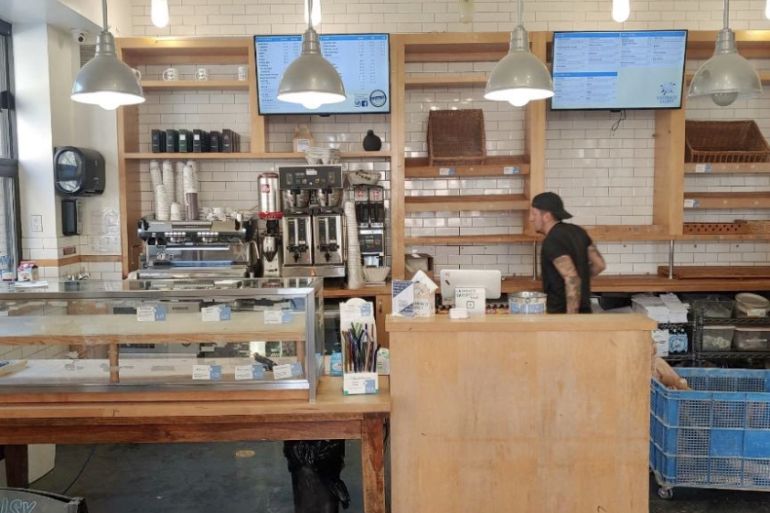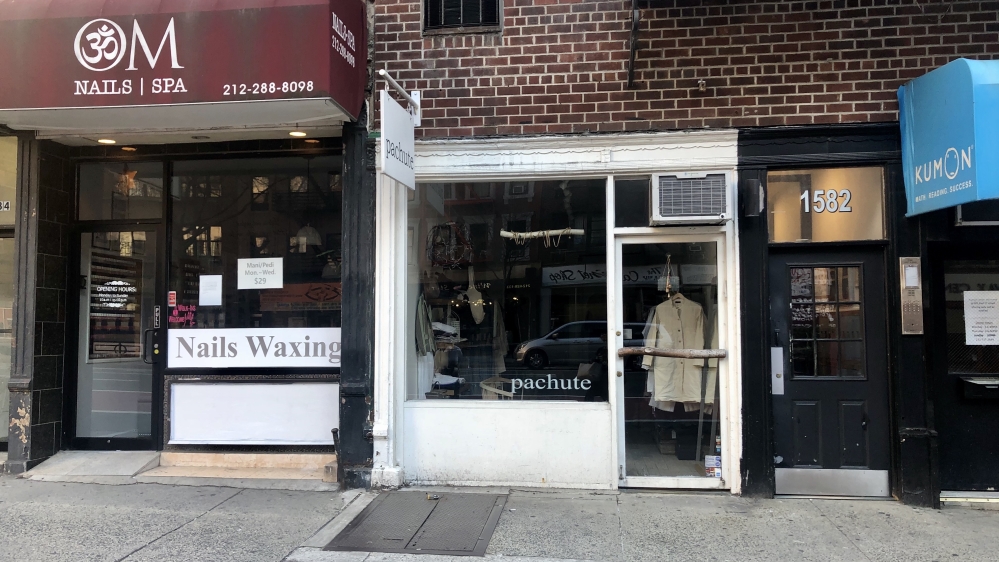For millennials, coronavirus economic blow awakens bad memories
Derailed by the Great Recession as youths, US millennials fear the financial toll of the pandemic.

New York, United States – Thirty-nine-year-old Jon Bernier is co-owner of Tiny Fish Printing company in Rochester, a city in northern New York State. Last week, he laid off all of his 32 employees after business plummeted 90 percent following Governor Andrew Cuomo’s order to shutter all non-essential businesses to halt the spread of coronavirus.
“There’s not much left to print,” he told Al Jazeera. “Everything kind of fell off.”
Keep reading
list of 4 itemsWill the US unemployment rate continue at historic lows?
Is the US media layoffs phenomenon the next housing crisis?
First 100 days: Milei falters on shock therapy for Argentina’s economy
The blow to his business is even more stressful, given Bernier’s increasing personal responsibilities. He and his girlfriend Stephanie, already parents of a one-and-a-half-year-old son, are expecting their second child – a daughter- in May.
Bernier’s mother, who suffers from dementia, recently had a stroke, but he can’t see her because the care home where she lives has barred visitors as a precautionary measure against coronavirus.
“I definitely have anxiety about all of it, but I don’t like to dwell,” he said.
Further south in New York state, on the island of Manhattan, Emily Reddix, a 32-year-old retail manager, had just finished what she described as “a good cry”. The owner of Pachute, the women’s clothing boutique she manages, called to tell her that all four store locations were closing until further notice.
“Am I going to lose my job? Am I going to completely deplete my savings?” Reddix asked Al Jazeera. “I worry a lot that small businesses won’t be able to bounce back from this.”
On Thursday, the United States Department of Labor reported that a staggering 3.28 million Americans filed for unemployment benefits last week as the first wave of coronavirus layoffs hit the economy.
For millennials – those born between 1981 and 1996, as defined by the Pew Research Center – the economic fallout of the pandemic is a grim reminder of the financial vulnerability they felt during the 2007-2009 Great Recession, when many of them were just entering the workforce.
‘We’re all going to be starting over after this’
Reddix moved to New York in the summer of 2009, after graduating from Radford University in Virginia with a degree in fashion design. Like many of her peers at the time, she could not find paid employment in her field.
“There were only unpaid full-time internships,” she said.
Unable to gain a foothold in fashion design, she took a retail job instead, and slowly worked her way up to management. Now she fears all of her professional gains could be undone by the coronavirus pandemic.
“We’re all going to be starting over after this,” Reddix told Al Jazeera. “I’m scared whether I can financially handle this. And being in retail, I worry whether people are going to shop the same way they did after this is over.”

While those from Generation X (born between 1965 and 1980) or even Baby Boomers (born 1946 to 1964) may share similar worries, economists say it is the estimated 73 million millennials in the US – believed to be the country’s largest generational cohort – who could suffer the greatest financial setbacks from the pandemic.
Among the reasons why – many millennials are entering this crisis on less secure financial footing than older generations.
“Because many millennials were slower to enter the job market during or just after the Great Recession and often took jobs that may not have paid well, nor had benefits, their income, savings rates and retirement savings have lagged behind those of previous generations,” Camille Busette, senior fellow of economic studies at the Brookings Institution, told Al Jazeera.
Millennials are lagging on key economic milestones compared with older generations. In 2018, 15 percent of millennials lived with their parents – compared with eight percent of Boomers and nine percent of Gen X’ers when they were the same age, according to data compiled by the Pew Research Center. Millennials also have lower levels of accumulated wealth than previous generations, and are starting families later.
“Millennials never recovered from the 2008 recession. They just got on their feet and now they’re knocked sideways yet again,” Jill Filipovic, the author of OK Boomer, Let’s Talk, told Al Jazeera.
Filipovic points out that the crisis is striking older millennials at a pivotal moment in their financial lives.
“This is when we’re scaling up to that peak to save for retirement, buy a house, have a family. It is so financially devastating,” she said.
When Daniel Saldarriaga moved to New York in 2002 with his father from Guayaquil, Ecuador, he wanted to go to college. But those plans were derailed because he needed to earn money to help support his family.
Now 35, Saldarriaga is an assistant manager at Grandaisy Bakery in the downtown neighbourhood of Tribeca in Manhattan.
Unlike many shops in the city, the bakery is still open because it is considered an “essential” business. But many staff have been laid off.
“It was a snowball effect. We had 80 employees, and now we’re down to 13. We just sent everyone home,” Saldarrianga told Al Jazeera. “I don’t see us being open for more than two weeks. The income is gone. We are hanging by the skin of our teeth.”
It was a snowball effect. We had 80 employees, and now we're down to 13. We just sent everyone home.
Saldarriaga disagrees with New York’s lockdown order, because he thinks there are greater things to fear than COVID-19.
“I’ve seen extreme poverty growing in Ecuador. The need to feed your family – the fear of losing that overrides the fear of any disease or virus,” he said.
“When there were people dying from dengue fever in Ecuador, the first cry for help was always ‘we don’t have money, what are we going to do?’,” said Saldarriaga. “Even as sick and poor as you are, you would rather be sick but at least know that you have a job, than sick and have no job.”
A lifetime of ramifications
On Friday, President Donald Trump signed into law a $2 trillion coronavirus relief package.
Measures in the legislation designed to help workers include one-off direct cash payments of $1,200 for individuals and up to $2,900 for families who qualify; a $600 federal weekly top-up on state unemployment benefits; extended jobless benefits for contractors, the self-employed and gig workers; and deferred payments on federal student loans and government-backed mortgages.
The law also extends a lifeline to small businesses to help them stay afloat.
With $1,200 in rent due in April, Reddix is hoping that the one-off cheque promised under the federal relief package will arrive sooner rather than later. But she still worries about what happens after it is cashed.
“If this goes on for months, we’re all going to need more than that,” she said.
Bernier is filling out forms for loans and grants available to small businesses under the federal relief package, and trying to land work with hospitals, healthcare facilities, and utility companies to earn an essential business designation. If he can, he reckons he can reopen his printing shop before the lockdown lifts and hire back at least six of the 32 employees he was forced to lay off.
But whenever he’s back in businesses, he hopes it returns to normal as swiftly and suddenly as it was forced to shut down.
“This is far worse than the Great Recession,” he said, “because it happened so fast.”